Comparing RV insurance companies looking for the right coverage? It’s not an easy task. These are our top five favorites.
5 Best RV Insurance Companies on the Market Today
Choosing from the myriad of best RV insurance companies can be a challenge—and many RV owners don’t know where to start. Since a camper also serves as a bedroom, kitchen, bathroom, and more, it requires a very specific type of policy to ensure proper coverage.
When choosing which RV insurance company you’ll trust with your beloved camper, it’s important to consider a few things:
- Cost
- What is actually covered
- How much you need
- How much you’re legally required to have
What exactly is the difference between auto and RV insurance? Who is the best RV insurance provider? Will you need full time RV insurance or just part-time vacation liability? Should I find an independent insurance agent that specializes in RVs or choose a nationwide company?
I’ll help you compare five different insurance companies, break down RV insurance, and understand everything it entails!
-
Our Top Picks
- Best RV Insurance Company Overall: Roamly
- Best RV Insurance for Ancillary Coverage: Good Sam
- Best RV Insurance Bundles: Progressive
- Cheapest Rates for RV Insurance: Geico
- Best RV Insurance for Specialized Plans: National General
Best RV Insurance Companies
-
Roamly: Best RV Insurance Company Overall

Roamly is a unique RV insurance provider because it is one, if not the only insurance company that will let you rent out your RV without losing coverage. It is backed by RV experts and is one of the few RV insurance companies that focuses solely on RV and camper van coverage.
Since their insurance is solely focused on RVs, they offer better coverage at lower rates by leaving out coverages you don’t need. You’re able to cancel, change, or switch your insurance at any time. And their customer support team is in-house and US-based.
According to Roamly, customer Lauren S. got Roamly RV insurance coverage for 33% less than competing agencies, including a multiple-vehicle discount rate. Mike J. also published a testimonial stating that he saved $3,413 per year by switching to Roamly.
Roamly offers two types of liability protection:
- Property damage liability covers the other person if you’re found at-fault for damaging their property (vehicle, fence, garage door, etc.).
- Bodily injury liability covers the other person if you’re found at-fault for their injury — be it a driver or pedestrian.
Additionally, they offer:
- Comprehensive coverage: for your RV that’s non-collision-related (aka hail, theft, vandalism)
- Collision coverage: pays for repairs on your RV if it collides with another vehicle or object (regardless of fault)
- Medical payments coverage: will foot your medical bills for you or your passengers
- Uninsured/underinsured motorist coverage: if an at-fault driver doesn’t have any or enough insurance to cover your repairs or medical costs
- Roadside assistance: for tows, fuel delivery, jumpstarts, and more
Since Roamly specializes specifically in RV coverage for RV owners, they offer a comprehensive full-time motorhome insurance package if you live in your RV for 6 months or more per year. Full-time RV insurance coverage includes all the above, plus:
- Loss assessment for HOA fees
- Emergency expense coverage for temporary housing if your RV isn’t liveable after a covered incident
- Adjacent structures coverage for any stand-alone structures on your site (porches, carports, decks)
- Debris removal to clear out rubble after a covered incident
Coverage for RV Owners Renting out their RV
Due to a commercial use exclusion clause, many RV insurers will actually drop your policy if you rent out your RV. Instead, Roamly actually encourages you to rent out your RV by offering owners utilization-based discounts.
The more you rent out your RV, the more discounts you get through their “Rent and Save Money” discount. They are the only company that offers this option.
Commercial RV insurance
If you rent out three or more RVs regularly, Roamly offers a commercial RV insurance policy. It covers all the associated risks with running a business. Roamly lowers rates by only insuring the time between rentals since your customers pay for insurance during the rental period.
-
Good Sam: Best RV Insurance for Ancillary Coverage

Good Sam insurance agency is considered one of the best RV insurance companies because of its thorough coverage. They are a full-service insurance agency, meaning they offer options from four major insurance providers to create a customized RV insurance quote online.
Beyond their customized quotes, they have a membership you can sign up for that includes discounts from gas stations, camping sites, insurance policies, and more. RV coverage is also available in all 50 states.
Good Sam offers plenty of RV coverage packages, plus unique premium protections. They also offer policies for both full-time and part-time RVers.
Their customer service is available 24 hours a day, 7 days a week. In fact, customers report an average savings of $530 per year, with a 96% overall customer satisfaction rating.
They also cover all types of RVs, with policies available for class A, B, and C motorhomes, airstreams, fifth-wheel trailers, truck campers, travel trailers, and more.
Good Sam’s standard coverage includes collision, comprehensive, uninsured/underinsured, personal liability, property damage liability coverage, bodily injury liability, and personal injury protection. It also covers up to $3,000 in personal property damage.
Their premium RV insurance coverage includes optional full replacement cost coverage, vacation liability, full-timers, emergency expense, medical payments for others not on your policy, permanent attachments coverage (awnings, antennas, etc.), and personal effects.
They even offer an extended warranty to cover recreational vehicle maintenance costs!
Available discounts include:
- Multi-vehicle discount: up to 20% combining RV and auto into one policy
- Paid in full: reduce premium when you purchase your annual with one payment
- Multi-policy: up to 10% when you insure your home
- Storage: pauses coverage when RV is in storage, save an average of 53% per year
While Good Sam has many perks, it is worth noting that they use National General as one of their RV insurance providers. As a third party, they make money by connecting you with policies and charging a bit more for the RV policy. Ultimately, they are more expensive than working directly with National General.
-
Progressive: Best RV Insurance Bundles

Progressive is one of the largest RV insurance companies in the country, trusted by over 18 million people. Their strengths include heavy discounts and accident forgiveness. Insurance is available in all states except Hawaii and Washington DC.
One great benefit is you can get an RV insurance quote online fast, with lots of customized policies and bundle options if you also own another car, home, etc.
They offer basic liability for recreational vehicles (class A, B, and C), truck campers, all trailer types, fifth-wheels, and pop-up campers.
Progressive’s standard insurance includes comprehensive and collision, liability (only for motorhomes), uninsured or underinsured motorists, and medical coverage for you and your passengers.
Additionally, they offer add-ons such as total loss replacement, roadside assistance, vacation liability, full timer’s liability, loss assessment, pet injury coverage, and emergency expense covered.
They offer 10 major discounts for bundling, paying your annual RV insurance policy up front, getting a quote in advance before purchase, and more:
- Multi-policy
- Quote in advance (at least 1 day before policy starts)
- Original owner
- Pay policy in full upfront
- Responsible drive: no accidents/violations in last 3 years
- Prompt payment: on-time payments
- Claim free renewal: no at-fault claims
- Homeowners: own home, condo, townhouse, duplex
- Continuous insurance: based on the previous insurer
- Paperless
They also offer three accident forgiveness opportunities:
- Small: won’t increase if the claim is $500 or less
- Large: after four years of coverage with Progressive, and accident-free for three, your rate won’t increase for any accident
- Disappearing: subtracts 25% from your deductible amount for every claim-free period, all the way down to zero
One cool aspect of Progressive is their “Name Your Price Tool”. Instead of starting with all the RV policy inclusions you want and then figuring out a price, you can actually insert a desired insurance rate and Progressive will provide you with a range of insurance coverage options within your budget.
Similarly to Good Sam, Progressive uses National General as an insurance provider. This means that Good Sam is simply a third party that is connecting you with National General. They add a fee on top of the insurance price so they can make some sort of profit off the insurance sale.
-
Geico: Cheapest Rates for RV Insurance

Geico is an extremely popular insurance company because they have an entire team dedicated to being RV specialists. Their policies are extremely flexible, making it easy to create a custom coverage package.
Researching Geico’s insurance policies is easy since they offer online quotes. Their personal effect replacement limits are up to $100,000, and their windshield deductible covers all repairs and charges only $50 for replacements.
An added bonus is their free accident forgiveness for drivers who have been accident-free for five years or more.
Geico offers the following RV insurance coverage:
- Motorhome class A, B, and C
- Emergency expenses
- Replacement cost of personal effects
- RV medical payments
- Special windshield deductible
- Total loss replacement
- Toy haulers
- Travel trailers
- Vacation liability
While Geico is a popular and well-known insurance company, they don’t offer coverage in all states. If you reside in Hawaii, Massachusetts, Michigan, or North Carolina, you won’t be able to purchase coverage. Their total loss replacement coverage availability also varies widely by state and vehicle value
-
National General: Best RV Insurance for Specialized Plans

National General offers extensive RV insurance coverage for RV owners with the most customized policies over any other insurance agency. They are available in all states, provide excellent full-time policies, and have 24-hour customer service care, 7 days a week.
They can easily provide an initial RV insurance quote for interested customers, which can be saved for a later time. They even offer a specific discount for seeking out a quote in advance.
National General’s standard coverage includes complete general liability, comprehensive and collision coverage, personal effects, vacation liability, and emergency expenses.
Additional premium coverage options include specialized equipment, full replacement cost coverage, mechanical breakdown, permanent attachment, off-season storage savings, mechanical breakdown coverage, full-timers, and emergency peace of mind.
Their specialty lies in customer service. One of their best features is their search assistance if your RV is stolen or totaled. Their exceptional customer care also includes:
- Search assistance: research expert to help locate new RV in case of total loss
- No charge for new parts: in collision, will replace depreciated parts with new
- 24-hour claims reporting
- Theft reward: $500 reward if somebody can give a tip to help find the person
- Pick up and drop off: pick up RV and bring you a rental car and deliver RV after fixed/return rental car for you
- Free inspection: after initial RV insurance claim is filed
- Emergency expense coverage: up to $250 per day for food and lodging if you’re more than 50 miles away from home
- Discounts: safe driver, multi-vehicle (up to 20%), low mileage, and more
Another unique add-on they offer is suspending coverage if your RV is in storage. Many other agencies will provide a discount for this, but National General will actually pause your liability and collision coverage for you, offering savings up to 53%.
As mentioned above, National General is actually the insurance provider for many other insurance companies, such as Good Sam and Progressive. Those other agencies are simply third-party RV insurance companies that charge you more for policies. Insuring directly through National General will cut out extra fees and give you the best rate possible.
What Is RV Insurance?
RV insurance is coverage that protects you against theft, loss, and accidents related to your RV.
Think of it as a hybrid between auto and homeowners insurance. You still need to choose your deductible and coverage limits and create a policy that works for you and your needs.
Most RV insurance policies include liability, comprehensive, collision coverage, and under or uninsured motorist coverage. More extensive coverage takes care of the engine, wheels, automotive parts, and all home belongings within the RV.
RV insurance doesn’t just cover the average RV. It also covers truck campers, teardrop trailers, fifth-wheel trailers, and more. Basically, it can be broken down into two sections: motorized and towable.
Motorized RV insurance covers class A, B, and C vehicles, while towable RV insurance covers travel trailers, teardrop trailers, fifth-wheel trailers, and pop-up campers.
Am I Required To Have RV Insurance?
Usually, yes. If an RV has an engine it is likely required to have its own policy. If you’re using a trailer or a separately attached RV, it’s not as likely required. A towable RV may also be covered under your existing auto insurance policy for the vehicle that you use to tow the RV.
What will determine your requirement is the state you plan to register your RV in. In fact, every state, except Virginia and New Hampshire, requires minimum liability coverage if the vehicle is driven on the road. Over half the states require uninsured or underinsured insurance.
According to CarInsurance.com, “Almost every state requires you to have bodily injury liability insurance to pay for the treatment of anyone you injure; other states operating under no-fault laws will require that you carry personal injury protection to pay for your own injuries. You usually will be required to buy property damage liability to repair the vehicles of anyone you hit.”
A great rule of thumb is: if it’s motorized, it needs insurance. If you tow, insurance is optional (depending on your state.)
Let’s look at some more factors. If you live and travel in your RV full-time, then the answer is yes. Absolutely. You need RV insurance.
If purchasing through a lender, they may require you to have coverage. In fact, most banks giving you a loan will require you to have some sort of coverage.
What isn’t usually required and is considered optional is comprehensive coverage (theft, windshield damage, vandalism), personal belongings coverage, and medical payment coverage.
Overall, if you only use your RV for one or two trips per year, it may be more cost-efficient to purchase vacation liability or short-term insurance instead. You may even be able to add it to your regular auto insurance temporarily. Plainly put, it doesn’t make sense to pay for insurance year-round if your RV is spending most of its time in storage.
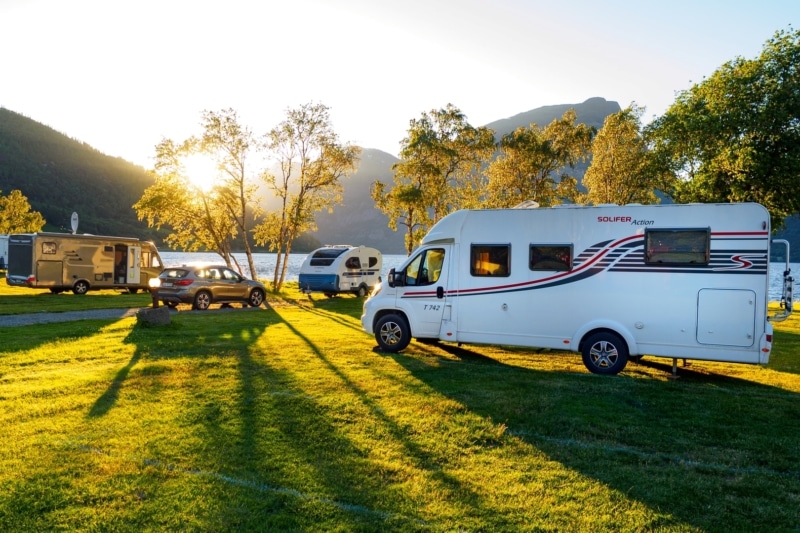
RV Insurance vs Car Insurance
RV insurance is similar to car insurance but has a few more aspects. It requires a bit more detailed coverage options and is definitely more of a specialty.
RV Insurance
RV insurance tends to be more comprehensive than auto insurance. It offers specific protection to RV drivers that might not be covered under regular car insurance.
Not only does it cover the actual mechanical needs of a vehicle, but it will also cover things you may lose if damage occurs while the vehicle is mobile, such as personal items, emergency expenses, and replacement costs.
RV insurance policies tend to look like a mix between auto and home insurance, or maybe even boat insurance!
Car Insurance
Car insurance is for any car on the road. It just covers the basics of a moving vehicle.
It merely focuses on mostly just that: the car. It covers the engine, bodywork, paint, etc. It simply focuses on the V (vehicle) part of RV (recreational vehicle).
It’s worth noting that you can add RV coverage to most car insurance policies. While this may not be as comprehensive as you’d like or need, it is an option. You can also just have an auto insurance policy for your RV if you’d like, but it will only cover the vehicle, not any of the build or items inside the vehicle.
Types of RV Insurance
One major factor that plays heavily into what kind of insurance policy you should get is if you use your RV full-time or part-time. Your policy coverage needs and the cost of your annual premium will definitely vary based on your usage.
Full-Time RV Insurance
If you are on the road full-time, you are statistically more likely to have an accident or damage occur to your vehicle. In this sense, it’s important to consider complete personal liability coverage. It’s similar to liability for a home since your RV is technically your house.
What this coverage does is takes care of you 24/7. The policy is enough to cover personal belongings in the case of damage or theft (expensive items such as electronics, computers, cameras, etc.)
This is a scenario where emergency expenses coverage may be more important than a part-timer. If you live in your RV and something happens or you need mechanical work, or it takes a while for parts to arrive, you can have policy add-ons that cover hotel or food expenses while you’re out of your RV.
For full-time recreational vehicle insurance coverage, it is generally recommended to have:
- Full collision and comprehensive
- Personal belongings coverage
- Total loss replacement cost
- Full-Time RV liability coverage
- Emergency expense allowance
- Specialized coverage (based on upgrades for your RV)
Personal property coverage is really important since break-ins on full-time dwelled vehicles are more likely. If you’re full-time, you also likely keep all of your personal belongings in your RV, so you can be reimbursed if anything were to happen to them.
If you have a pet that lives with you in the RV full-time as well, it is highly recommended to get pet injury coverage.
Part-Time RV Insurance
Part-time insurance can be much simpler than full-time. Generally speaking, it is recommended to have a policy that includes vacation liability coverage and various discounts, such as a storage option or low mileage add-on.
Vacation liability insurance is basically the same as personal liability coverage recommended for full-timers, except the coverage is only for a temporary time frame. This protects you from legal liability of injuries but is only accessible if you’re in the RV part-time.
(Tip: please check with your insurance agency to figure out what they consider “part-time” as it will vary from company to company.)
Storage coverage options offer a discounted rate if you plan to stow away your RV during the off-season. In fact, this policy add-on can actually reduce your premium by up to 53%.
Another great applicable discount is diminishing deductibles! If you drive less, you’re less likely to have to file a claim and after a certain number of years with clean driving history, many RV insurance companies will lower your deductible.
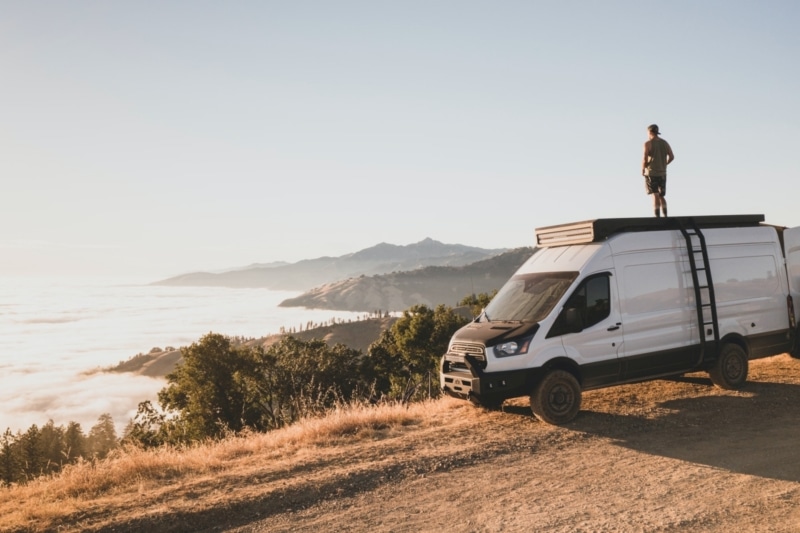
What Does RV Insurance Cover?
With RV insurance, there is an abundance of options that allow you to build a policy that perfectly suits your needs.
It can generally be broken down into two sections – standard coverage, and premium add-ons.
Standard coverage includes:
- Bodily injury liability: you hurt someone while driving
- Property damage liability: damages you cause while driving
- Collision: damage to your RV caused by road accidents, regardless of fault
- Comprehensive: all non-collision damage (fire, wind, theft, etc.)
- Personal injury protection: medical expenses for yourself and your passengers
- Uninsured and underinsured motorist: protects against damage caused by drivers with little or no insurance
Premium add-ons include:
- Roadside assistance: helps if RV breaks down
- Towing and labor: covers towing costs and mechanical fixes
- Vacation liability: coverage while using your RV as a temporary home
- Replacement cost coverage and personal effects: pays to replace RV and anything in it in the case of an accident or heavy damage
- Full-time usage: coverage if using your RV full-time
- Trailer coverage: travel trailers and anything you keep in it while attached
- Emergency expense coverage: pays for temporary housing if your RV isn’t liveable after a covered incident
Most insurance agencies will have some sort of basic RV insurance package that is a great starting point. From there, you can add extra options and discounts to customize your policy.
How Much Does RV Insurance Cost?
On average, RV insurance costs between $1,000-$2,000 per year. However, this really varies depending on your age, state, vehicle, driving records, type of coverage, deductible, discounts, and whether you’re full-time or not.
Typically, part-time RV insurance costs less than auto insurance since they aren’t driven as much, around $1,000 per year. But if you’re full-time, the cost will mirror the price of home insurance, up to $2,000-$3,000 per year.
A great place to start researching prices is by looking at the average policy prices in your state of residence. In some states, the bare minimum for RV insurance starts as low as $200 per year. In other states, it can cost thousands of dollars per year.
Areas with extreme weather usually have higher insurance premiums. More mild-weather areas will be less expensive.
Another telltale is considering your RV’s make, model, mileage, and year. Class As are usually the most expensive to cover since they’re the largest type of motored RV. The bigger the RV, the higher the premium.
Newer vehicles may be less expensive because of potential warranties and are less prone to heavy mechanical work. Older models may be more expensive because they can require more work, be more prone to breakdowns, and have higher mileage.
Don’t forget about premium add-ons! The more add-ons you choose for your RV insurance policy, the more expensive it will be. For example, adding roadside assistance could increase your monthly cost by $20 or more. If your RV has slide-outs or other extra accessories, this can also cost more.
The more discounts you qualify for, the cheaper your policy will be. See if you’re eligible for any of the following discounts: bundling, good driver, original owner, no smoking, paperless, homeowner, pay-in-full, safety features, storage option, or military/government profession.
Additionally, make sure your policy is particular to your financial situation. You can tweak deductible and limit amounts, which will affect your premium. You can pay less per month but you’ll be responsible for more if an accident or damage occurs.
How Much RV Insurance Do I Need?
The amount of insurance you’ll need is going to be very dependent on your particular situation. To start, the minimum insurance required is based on your state of residency. For a few states, insurance isn’t required at all.
Beyond the legal minimum, insurance is all about risk. The more you’re willing to risk, the less you’ll have to pay toward a premium.
It’s important to consider your financial situation, how often you use your RV and the total value of your RV. Build a policy around your budget, your particular vehicle, and the way you use your vehicle.
Think about the type of RV you have, where you plan to travel, how often you plan to travel, extra custom features of the RV, and what you really want to protect. For example, if you have an older camper but a great build-out, it may be worth focusing more on build coverage.
My best advice: make sure you have sufficient insurance to the point that you’re not screwed financially if an accident or large damage occurs.
Other Insurance For The RV Owner & Family
Beyond the normal liability and comprehensive coverage that is recommended for insurance on a motorized vehicle, there are optional policy add-ons that make sense, particularly for RV insurance.
Personal property and attachment coverage
Personal property coverage takes care of just that: all your personal belongings and effects. This includes laptops, TVs, cell phones, etc. Basically, any valuable, personal item that you own and travel with is covered.
Personal attachments coverage is anything externally attached to your vehicle: satellite, TV antenna, awnings, rear box storage, etc. This is especially useful if you have anything large attached to the top section of your van, such as a kayak. If you were to drive under a bridge or parking garage that is too low and caused damage, insurance would cover the costs.
Roadside assistance
Roadside assistance is a great way to relieve the stress of any incidents that occur roadside. You can simply call your insurance company and they will take care of you during an otherwise stressful occurrence.
This additional insurance coverage takes care of multiple costs beyond just towing.
Roadside assistance can also cover:
- Mechanical or electrical breakdown
- Battery failure
- Flat tire
- Lock-out
- Running out of fuel or other fluids
Keep in mind that most roadside assistance services are only available if you are a specific distance away from home. (The average company states 50 miles or more.)
RV Insurance FAQs
-
Who is the best insurance for RVs?
Roamly is my top pick for RV insurance.
-
What Insurance Should I have on my RV?
It depends on your state, how much you use your RV, and how much of a risk you want to take. Most states require a driver to have liability and uninsured/underinsured coverage. Consider this your bare minimum.
-
Is Full Time RV Insurance Worth it?
If you live in your RV full time, then yes. Absolutely. Even if you use your RV for half of the year, it is worth it. If you travel sporadically, consider getting coverage only for the times you’re using your RV.
-
Who Insures Motorhomes?
Most commonly: Geico, Good Sam, Progressive, Roamly, National General, Safeco, Nationwide, Farmers, All State, State Farm, RVInsurance.com, Auto-Owners, Blue Sky, Country Financial, and the Hartford.
-
Who Has the Best RV Insurance Rates?
National General offers the most bundles for the best rates. Plus, they are the insurance provider of other RV insurance companies like Progressive and Good Sam use. Skipping the third party and going directly to NG is cheaper.
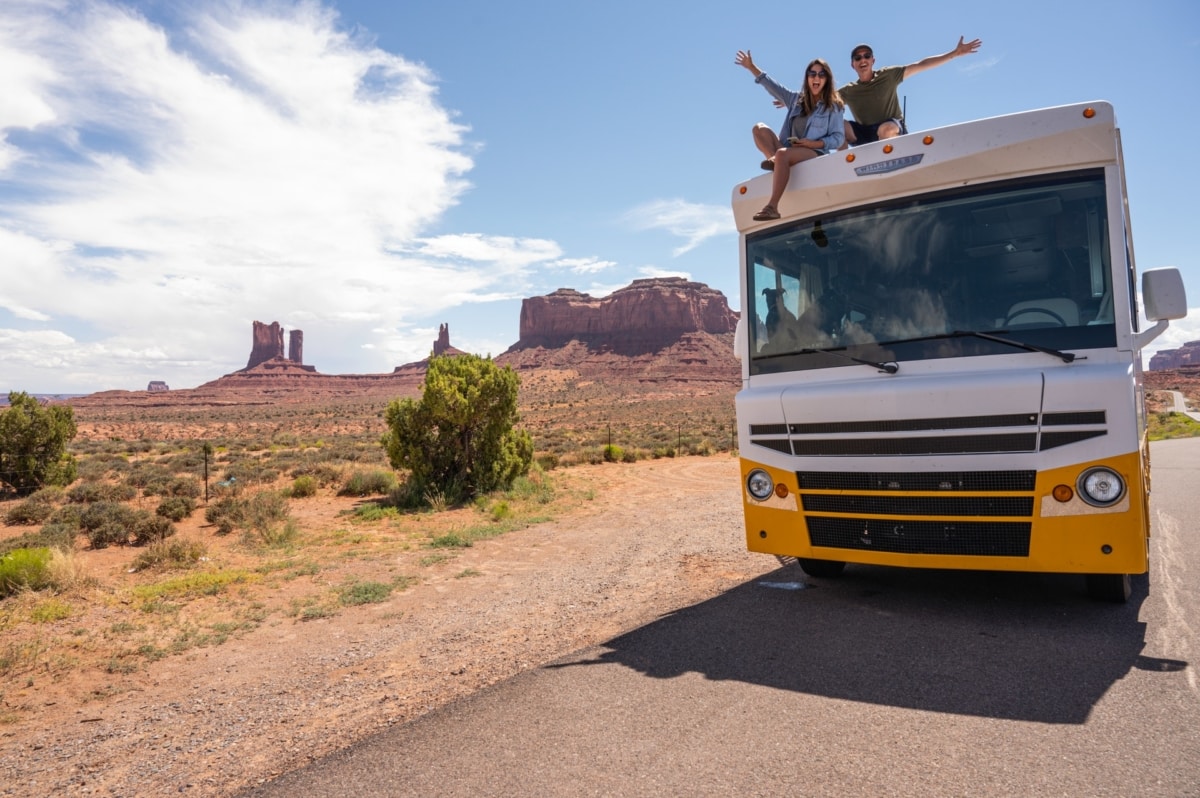

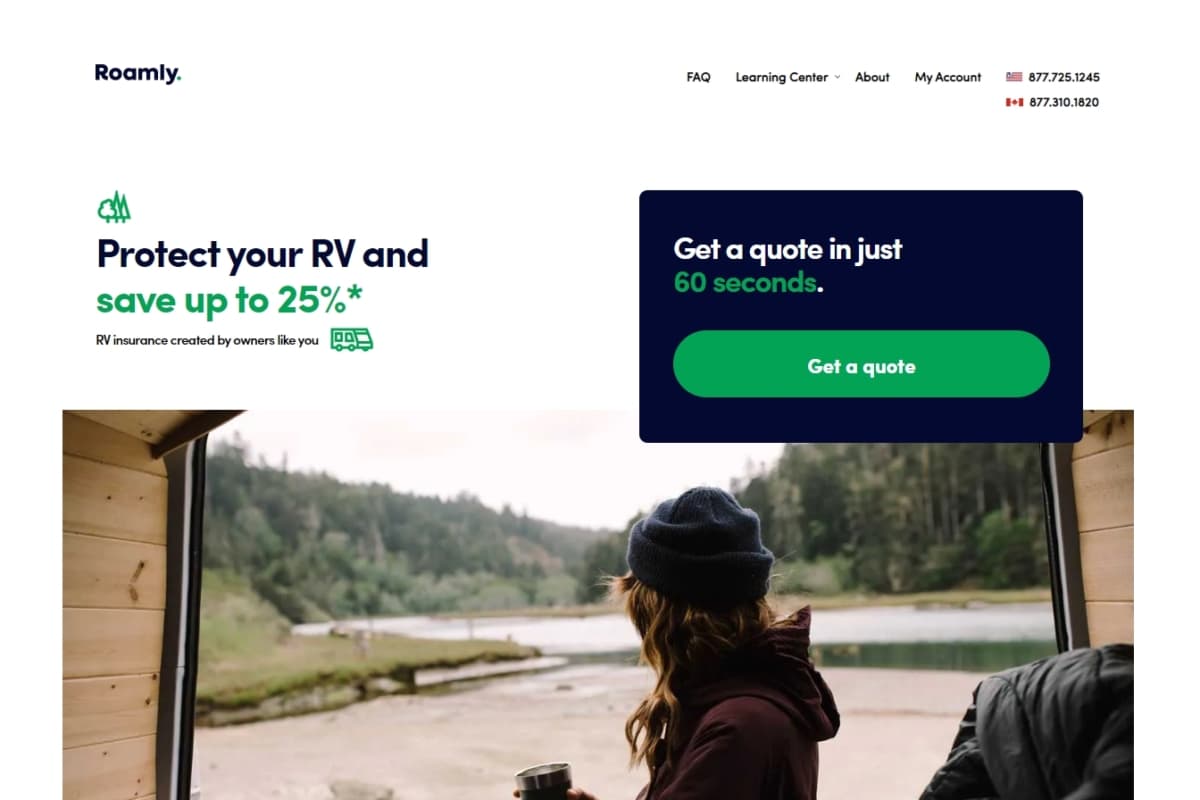
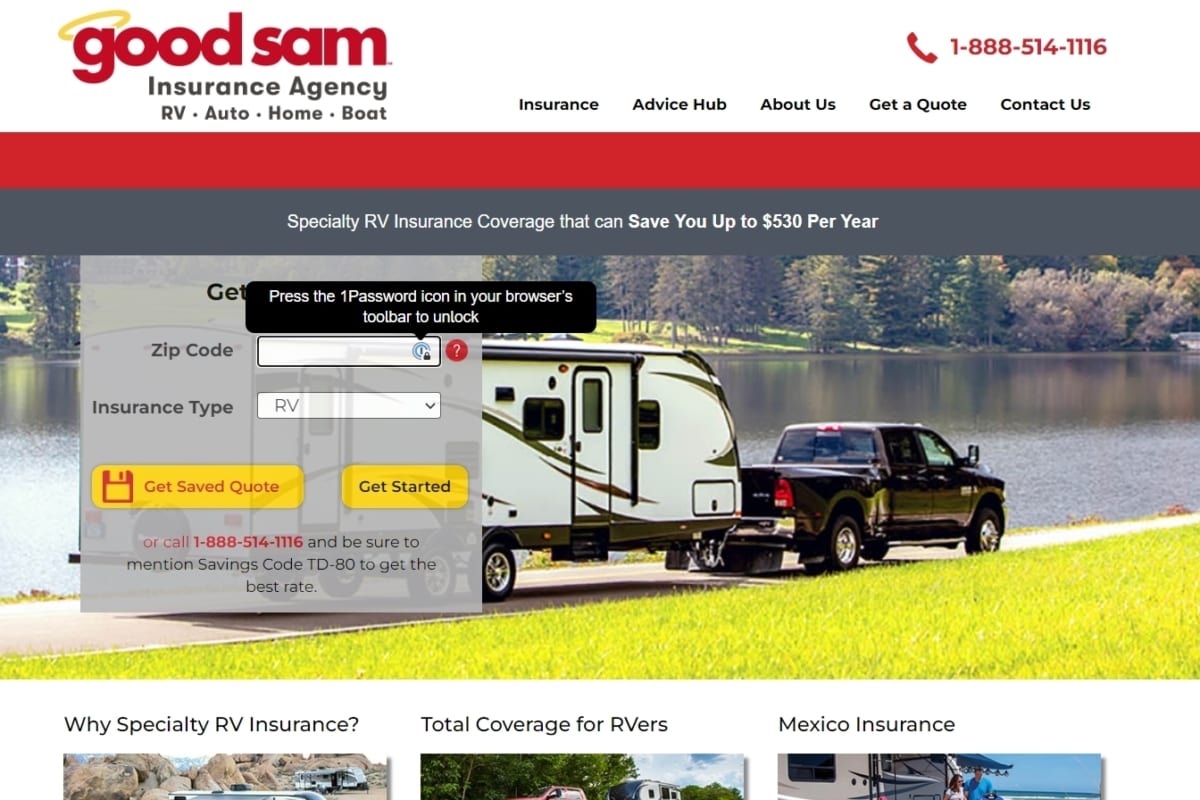
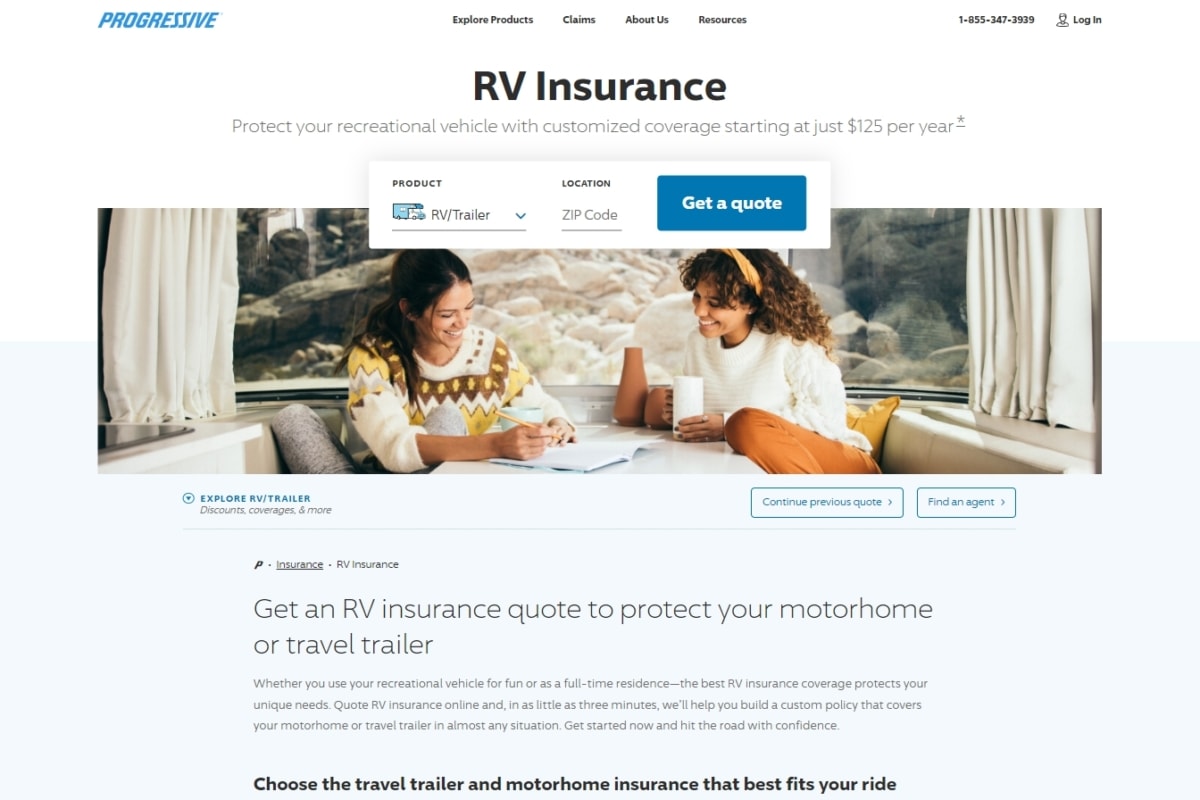
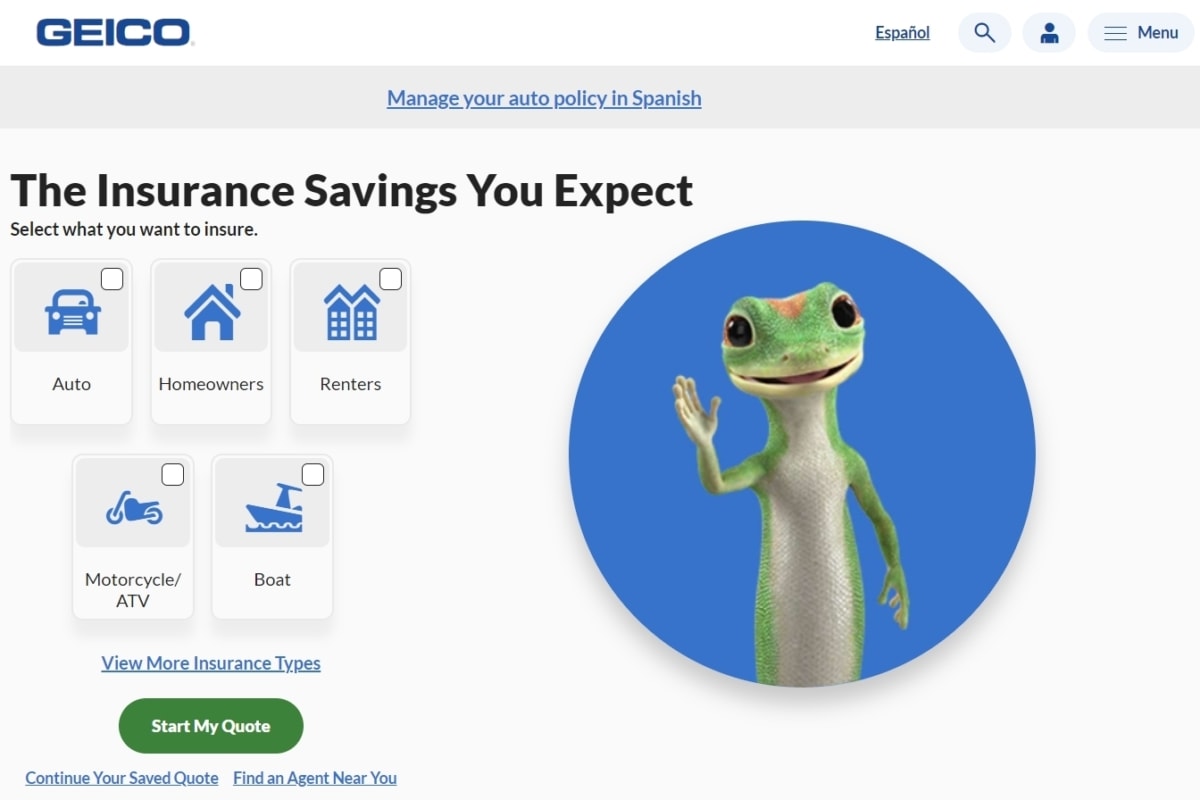
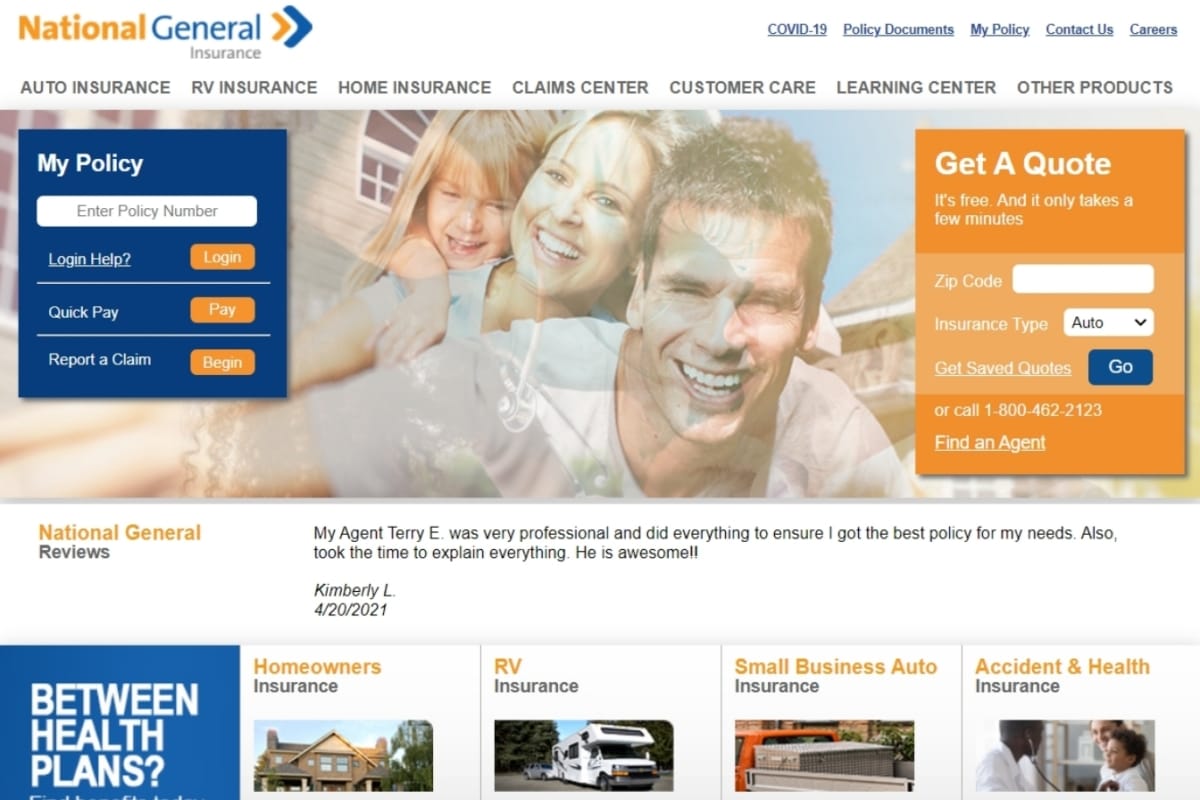
No depreciation on Progressive RV, boat and motorcycle policies.
This review sounds like paid advertising. My experience with Roamly has been a nightmare. They wont respond to a single email about a claim. My RV was totaled, i have full coverage, and rather than responding to any of my emails from the assessors they sent duplicative emails asking for the same photos and have continued to say that the damages exactly match the security deposit. Its actually fraud. Do not waste your money, and please be super skeptical of articles like this.
I’m sorry to hear about your experience with Roamly. For clarity, this is not a paid advertisement or sponsored article of any kind. The editorial team will review the article to ensure it doesn’t read as such. Thanks for bringing this to our attention!
We are super happy with Roamly!